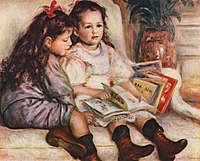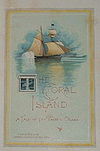
Back بوابة:أدب أطفال Arabic ویکیپدیا:ویکیپروژه ادبیات کودک Persian Portail:Littérature d'enfance et de jeunesse French
The Children's Literature Portal
Children's literature or juvenile literature includes stories, books, magazines, and poems that are created for children. Modern children's literature is classified in two different ways: genre or the intended age of the reader, from picture books for the very young to young adult fiction.
Children's literature can be traced to traditional stories like fairy tales, which have only been identified as children's literature since the eighteenth century, and songs, part of a wider oral tradition, which adults shared with children before publishing existed. The development of early children's literature, before printing was invented, is difficult to trace. Even after printing became widespread, many classic "children's" tales were originally created for adults and later adapted for a younger audience. Since the fifteenth century much literature has been aimed specifically at children, often with a moral or religious message. Children's literature has been shaped by religious sources, like Puritan traditions, or by more philosophical and scientific standpoints with the influences of Charles Darwin and John Locke. The late nineteenth and early twentieth centuries are known as the "Golden Age of Children's Literature" because many classic children's books were published then. (Full article...)
Selected article
Selected picture

An illustration by William Wallace Denslow of Humpty Dumpty, the character of the classic English nursery rhyme:
Humpty Dumpty sat on a wall,
Humpty Dumpty had a great fall.
All the king's horses and all the king's men
Couldn't put Humpty together again.
In this month
- 4 January 1705 – Death of Madame d'Aulnoy (pictured), who invented the term contes de fée (fairy tale)
- 12 January – Japanese anime series The Story of Pollyanna, Girl of Love, based on Eleanor H. Porter's 1913 novel Pollyanna, begins airing on Fuji TV
- 14 January 1886 – Birth of Hugh Lofting, author of the Doctor Dolittle books
- 25 January 1885 – Birth of Hakushū Kitahara, a popular Japanese poet who collected nursery rhymes
- 30 January 1977 – The first episode of The Hardy Boys/Nancy Drew Mysteries airs on ABC, featuring teenage detectives Nancy Drew and the Hardy Boys
Selected quote
WikiProjects
- Parent projects
- Literature • Books • Novels
- Main project
- Related projects
- Artemis Fowl • Discworld • Fablehaven • Harry Potter • Inheritance Cycle • Lemony Snicket • Redwall • Oz
What are WikiProjects?
Selected biography
Did you know...
- ...that Anna Laetitia Barbauld's (pictured) Lessons for Children (1778–79) revolutionized children's literature, introducing what novelist Frances Burney called a "new walk"?
- ...that Peter and Jane are the main characters in a series of 36 children's early readers for the English language published by Ladybird Books that have been in print for over 40 years, and have sold over 80 million copies?
- ...that the fictional goat Koziołek Matołek has been a popular Polish children's literature character since first appearing in 1933?
Featured content
Featured articles
 Chinua Achebe
Chinua Achebe Argosy (magazine)
Argosy (magazine) Bronwyn Bancroft
Bronwyn Bancroft Enid Blyton
Enid Blyton Chitty-Chitty-Bang-Bang
Chitty-Chitty-Bang-Bang The Coral Island
The Coral Island Gerald Durrell
Gerald Durrell Edmund Evans
Edmund Evans Ian Fleming
Ian Fleming The Fox and the Hound (novel)
The Fox and the Hound (novel) Anne Frank
Anne Frank The Guardian of Education
The Guardian of Education The Hunger Games (novel)
The Hunger Games (novel) Lad, A Dog
Lad, A Dog Ursula K. Le Guin
Ursula K. Le Guin Julianne Moore
Julianne Moore Baron Munchausen
Baron Munchausen The Phantom Tollbooth
The Phantom Tollbooth Proserpine (play)
Proserpine (play) Talbot Baines Reed
Talbot Baines Reed Sally Ride
Sally Ride J. K. Rowling
J. K. Rowling Scoops (magazine)
Scoops (magazine) Mary Martha Sherwood
Mary Martha Sherwood The Story of Miss Moppet
The Story of Miss Moppet To Kill a Mockingbird
To Kill a Mockingbird J. R. R. Tolkien
J. R. R. Tolkien When Megan Went Away
When Megan Went Away A Wizard of Earthsea
A Wizard of Earthsea Mary Wollstonecraft
Mary Wollstonecraft
Featured lists
Categories
Topics
Children's literature: Book talk • Children's literature criticism • Children's literature periodicals • International Children's Digital Library • Native Americans in children's literature
Young adult literature: Gay teen fiction • Lesbian teen fiction • List of young adult authors • Young Adult Library Services Association
Associations and awards: Children's Book Council of Australia • CBCA book awards • Governor General's Literary Award for Children's Literature and Illustration • IBBY Canada • American Library Association • Association for Library Service to Children • Newbery Medal • Caldecott Medal • Golden Kite Award • Ezra Jack Keats Book Award • SCBWI • Sibert Medal • Laura Ingalls Wilder Medal • Batchelder Award • Coretta Scott King Award • Belpre Medal • Carnegie Medal • Kate Greenaway Medal • Nestlé Smarties Book Prize • Guardian Award • Hans Christian Andersen Award • Astrid Lindgren Memorial Award • Society of Children's Book Writers and Illustrators
Lists: List of children's classic books • List of children's literature authors • List of children's non-fiction writers • List of fairy tales • List of illustrators • List of publishers of children's books
Things you can do

|
|
Related portals
Wikimedia



















